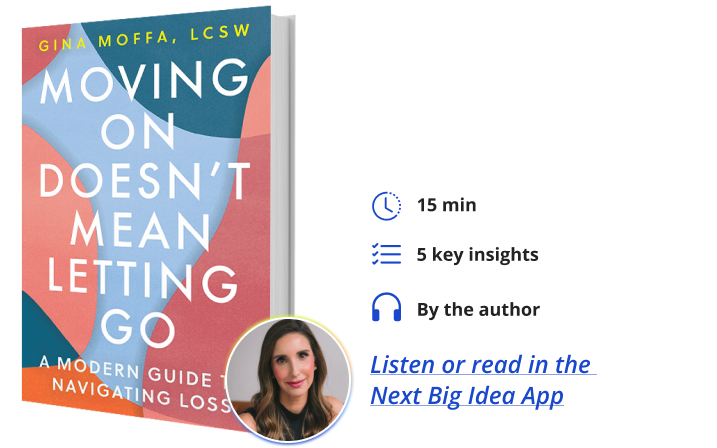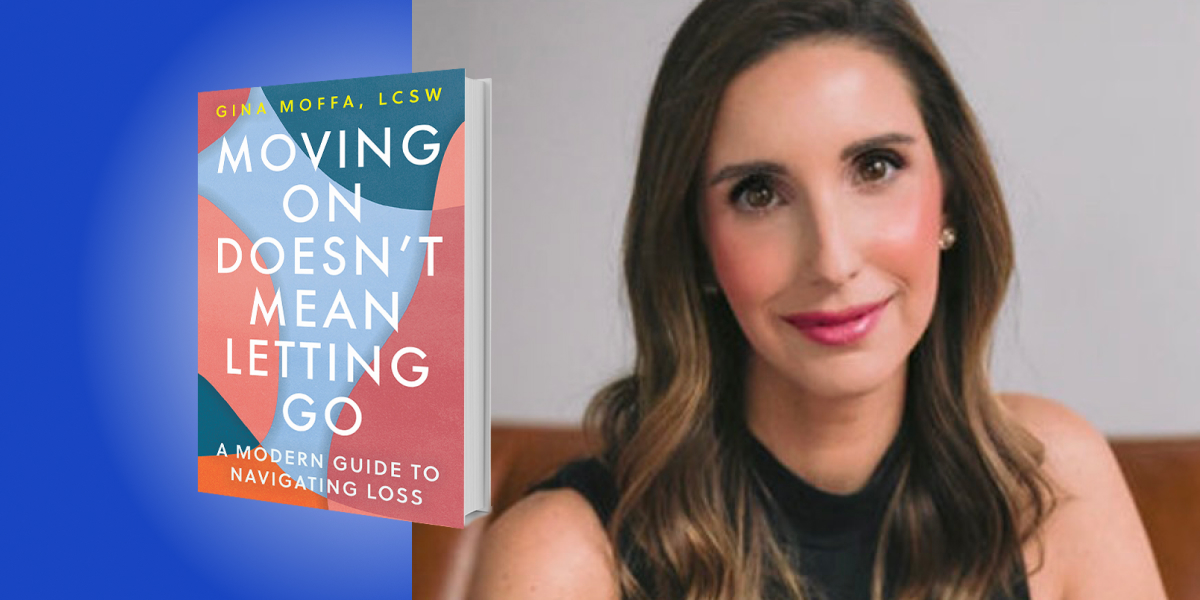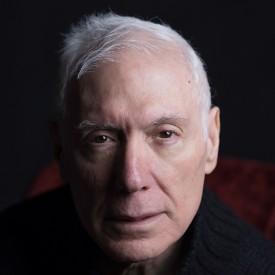Gina Moffa is a licensed psychotherapist in private practice in New York City. She specializes in treatments for trauma and grief, as well as challenging life experiences and transitions. She has worked with Holocaust survivors and was formerly a clinical director for Mt. Sinai Hospital Outpatient Program, specializing in substance use disorder. She received her master’s degree in social work with a specialty in trauma from New York University.
Below, Gina shares 5 key insights from her new book, Moving On Doesn’t Mean Letting Go: A Modern Guide to Navigating Loss. Listen to the audio version—read by Gina herself—in the Next Big Idea App.

1. Grief is the most prevalent mental health burden people are carrying post-pandemic, and it’s not all about death.
Grief is a natural response to loss, but it’s misunderstood as only a response to death losses. Death is absolutely devastating, of course, and yet, there are other devastating losses that get swept under the carpet. It also seems like society decides what is allowed to be grieved and for how long and in what way. This continues the stigmatization of grieving.
Losses are as deep and personal as the attachments we held. After all, aren’t the connections to partners and spouses, pets, friends, dreams, homes, jobs, imagined futures, communities, and so much more what make our lives worthwhile? When we lose those parts of our lives, it hurts—sometimes quite a lot. No amount of denial, whether on an individual or societal level, can undo the very real pain. We need acknowledgement and tender witnessing of our losses. By disregarding non-death grief, because society doesn’t believe it is grief, we prolong and magnify its impact on our health, well-being and relationships.
Even sudden identity shifts can be particularly hard to reconcile, leaving us with questions we can’t immediately answer: Who am I without this job/relationship/title/home? What does my life look and feel like, both to me and to others, when I’m not CEO/spouse/best friend/marathon runner/parent? Questions like these flow with abandon, but their answers are much harder to come by.
Whether death-related loss or other types of losses, we are forced to redefine, reimagine, rebuild or release parts of our lives and ourselves. It all takes time, obviously, but first we need to do what many of us have been taught not to do—pause, in whatever ways we can, and allow ourselves to feel, to grieve the loss and its many layers. We have to acknowledge it all, and allow it all. This is how we clean out the wounds.
2. Grief is a full body experience.
Grief is often viewed as an emotional response to loss, but let me not mince words here: grief is a FULL BODY EXPERIENCE. Our feelings aren’t just our emotions, they are also our physical sensations. In fact, without us even noticing, our bodies can start to bear the brunt of our grief experience. We don’t sleep the same. We find we’re struggling with inexplicable pain. Our muscles hurt. Our digestion is weird. We’re getting headaches all the time, or can’t seem to shake that cold. No part of the body is unaffected.
I’m so relieved that we have entered a time in our history where the mind-body connection is not up for debate. We can now have serious conversations around keeping the body and mind healthy and in balance together, without it feeling like just another wellness trend. In looking deeper at this mind-body connection, we have all heard of “broken heart syndrome” (also known as Takotsubo Syndrome), which occurs when an extreme emotion triggers a weakening of the heart muscles. This can lead to a heart attack, heart failure, shock, long term heart rhythm abnormalities, and changes in blood pressure. All the more reason someone needs significant support after loss, because the body simply holds onto the stress that comes with losing someone significant.
“The better we get at listening, the gentler the communications.”
Multiple studies have shown that grief increases inflammation in our body which can lead to increased health challenges or the exacerbation of pre-existing conditions. It can also lower our immune response, which makes us more susceptible to illness. We may find ourselves more easily catching colds or being exhausted. In fact, with many of my clients, being physically exhausted and finding themselves down with a cold are the common manifestations of their grieving.
Our bodies are wise and they will speak to us through any means possible. Most times, the better we get at listening, the gentler the communications. But when we’re used to ignoring or overriding its messages, the body starts to speak through symptoms that may bring real discomfort or pain, shouting louder and louder to get your attention. Rather than waiting for your body to produce a crisis that demands your attention, listen to what your body needs as often as you can. Grief takes so much more physical endurance than we’ve ever been taught, and we want to be aware of this, as people navigate their losses in a society that just keeps on moving.
3. Loss doesn’t have to be traumatic to feel traumatizing.
When we’re going to talk about grief and trauma, our minds go to some pretty catastrophic situations. Wars. School shootings. Increased violence. Environmental disasters. Genocide. Plane crashes and train de-railings. All of those losses present an overwhelming shock to the system for those who suffered through them. What I want to talk about, though, is something that we talk about enough, which is the way that a loss doesn’t have to be traumatic to be traumatizing.
Loss of any kind is a shock to the system. It makes us question what we know to be true about ourselves, our place in the world, and so many of the things that we take (or took) for granted. For some people, loss isn’t just life-altering, it’s life altering in a way that is traumatic, changing the way our minds and bodies feel safe in the world.
While first studying this topic, I was taught (and I believed) that the only kind of traumatic loss was a loss that was sudden, unexpected, violent, or ambiguous. According to research on traumatic loss in the European Journal of Traumatology, “Traumatic loss involves the loss of loved ones in the context of traumatizing circumstances and is a commonly reported traumatic event.” It’s a very specific definition that manages to be both limiting and maddeningly vague.
Over time I got the sense that, as a field, we were disinclined to consider the ways that loss, of so many kinds, could be truly traumatic for the person experiencing it. Many clients come to me with their nervous systems in hyperarousal, feeling like they cannot calm or ground themselves. It’s important to inquire deeper when someone tells me their symptoms, as I know there is more at play.
So, what makes a loss more traumatizing for some people? Well, our history plays a huge role. What’s in your past will tell you how to perceive what happens in your present. There are five key factors that contribute to a higher likelihood that loss may more profoundly impact your nervous system:
Type of Loss
Attachment to the Loss
History of PTSD/C_PTSD or traumatic loss
Weaker coping skill
History of high adrenaline or anxiety
There is an increased prevalence of people having a hard time coping with the feelings and sensations of their loss, to the point of feeling like they are emotionally, psychologically, even physically upended. It is important for me to help normalize that experience in order to help someone move forward in a way that will most benefit them and their needs. Understanding what we are experiencing is the path towards the right kind of healing for everyone individually.
4. We all cope and grieve in rhythms.
The bad news is that grief just doesn’t just go away. There is no “cure.” We don’t wake up one morning, sit up in bed with outstretched arms, notice the sound of birds and think to ourselves, “Well, I’m glad that’s over!” and then never feel the pang of our yearning to go back or feel the sting that comes on anniversaries, or have our breath taken away when a memory flies into our mind out of the blue. We always will be affected, just to different extents along the way that hold their own meaning and rhythm.
Given that so many of us are so ill-prepared for the grief state we are thrust into, it can help to have any opportunity to recognize our inner callings and needs. A way to look deeper at these tendencies is to see them as rhythms. Rhythms can change each day with different circumstances or reminders, emotions that spring up, or just wanting to be more connected to the grief process. Each Grief Rhythm exemplifies clusters of traits and habits you may exhibit at different points in the grief process.
“A way to look deeper at these tendencies is to see them as rhythms.”
One example of a Grief Rhythm out of eight I have created is:
The Survivor: This is a rhythm based solely on …you guessed it, survival. If this is you, your primary need is the continuity of what is right in front of you. Whether it’s pragmatic planning, taking care of kids, being a caregiver to someone else, a job that needs your attention, or simply making sure you’re taking good care of your own physical and mental wellbeing.
Other rhythms that we might feel and experience every day or even every hour are: The Diver, The Mover, The Compartmentalizer, The Ruminator, The Emotional/Spiritual Bypasser (ESB), and The Quality Controller.
Each of these rhythms is meant to help someone have a reference point for what they are experiencing. That way they avoid the sensation that they are in a spiral that feels uncontrollable and terrifying, as grieving can be disorienting. Having a sense of knowing what we can or might experience can offer us a way of normalizing a very unique and individual grief experience. We can, in turn, feel safe enough to lean into the grief and feel whatever we need to as it comes up!
5. The importance of self-compassion while grieving.
Let’s face it, even if we have been through losses more than once in our lives, we never really know what each new loss will bring our way. It can be utterly terrifying and disorienting.
As humans, we have a tendency to look around us for a point of reference, but in grief, it’s so hard, because everyone does grieve differently. Everyone will have a different relationship to a loss.
We can be hard on ourselves if we aren’t feeling better when we think society wants us to. People stop calling and checking, we stop getting those casserole dishes of food delivered and people stop asking about our loss in conversation. It can be hard when the world moves on and we are still grieving. We tend to feel lonely in loss and we judge ourselves and sometimes, even shame ourselves.
We need self-compassion, we need tenderness, but we are the last people to give it to ourselves. It will not take away the pain of loss, but having self-compassion when we are in this dark abyss of grief can powerfully shift our perception of our experience just enough to breathe easier at a minimum. Self-compassion helps us to prevent the piling-on to our already too-heavy emotional burden. We don’t need to compound the pain of loss with the pain of self-disparagement.
Rarely do we talk to ourselves as compassionately as we would speak to someone we deeply care for. The question is, why not? Grief, as we know all too well, can be isolating and scary. We can sometimes further alienate ourselves when we need comfort the most with our own judgment. Contrary to popular belief, the antidote to feeling weak, impatient, and frustrated with ourselves isn’t to beat ourselves up or berate ourselves for where we are, or even withhold our deepest needs. Rather, it’s granting ourselves more compassion, kindness, and curiosity.
To listen to the audio version read by author Gina Moffa, download the Next Big Idea App today:
































